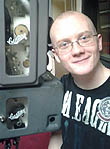|
|
This topic comprises 3 pages: 1 2 3
|
|
Author
|
Topic: I want to be a projectionist
|
|
|
|
|
Mitchell Dvoskin
Phenomenal Film Handler

Posts: 1869
From: West Milford, NJ, USA
Registered: Jan 2001
|
 posted 04-20-2016 08:32 AM
posted 04-20-2016 08:32 AM




> I want to be a projectionist, do technical work in a cinema
As Justin said, there are no more "projectionist" jobs left outside of a few retrospect theatres and arts centers.
As to technical work, ingesting files and building play lists is not really technical work. In most venues, technical work is handled by either an outside vendor or for larger circuits, their technical support department.
If just working in a Cinema is the goal, then getting into management is the way to go. If the interest is technical, going to college or trade school for IT and electrical engineering is the way to go, or getting a service/installer to take on an apprentice.
| IP: Logged
|
|
|
|
|
|
Leo Enticknap
Film God

Posts: 7474
From: Loma Linda, CA
Registered: Jul 2000
|
 posted 04-20-2016 01:35 PM
posted 04-20-2016 01:35 PM





There will probably be a very small number of actual projectionist jobs remaining (as in, ones that involve film handling and presentation), in the medium term at least, almost all of them in arthouse, repertory, university campus, archive screening theatres, and cinematheque type venues. I would suggest that anyone contemplating trying to train from the ground up to enter that line of work needs the following:
1. An affinity for technical/engineering and artistic/cultural issues. I've encountered many projectionists who know their Renoir from their Welles but can only just thread a machine (and even then, not accurately and every time), and those who can strip and rebuild a Norelco while drunk and blindfolded, but, in the words of my first boss, regard film as being something "that is this wide [holds thumb and forefinger roughly 35mm apart] and goes through a projector." Either person is guaranteed to have trouble working in the few remaining places that are likely to continue to need old school projectionists.
A major aspect of this is that you will need to deal with curators and programmers who believe that they are God's gift to their locale's cultural scene and have disappeared so far up their ass that they're in danger of re-emerging from their nose, ideally without losing your cool. Festival programmers and curators (many of whom are failed filmmakers and thus have chips on their shoulders) are, with a small number of honorable exceptions, some of the gnarliest people you'll ever have to deal with. They have spent many years playing God with filmmakers, deciding which entries that land on their desk are worthy of their patronage and which are not, and therefore their attitude to lowly technicians is that they are very much an inferior life form - of a lower caste even than bad filmmakers.
2. Related to which, the ability to work through technical issues with people who don't understand them and never will. "But I can do this on my Mac - why can't you do it exactly the same way in your theatre?" is a very familiar refrain you're going to have to develop strategies to defuse. You will also encounter the "little knowledge is a dangerous thing" syndrome as well, especially from academics. I was once forced to show Seven Samurai in 1.85, because the professor introducing the screening had seen it that way on an incorrectly transferred VHS copy and insisted that this was correct. Despite the fact that opening titles, foreheads, you name it, were all cropped, the manager sided with her, and even responded to customer complaints after the show by saying that she had pronounced this to be correct, and so it had to be correct. In situations like that, you just have to grit your teeth, smile, accept that you'll lose some of those battles, and unload about what an effing idiot this person is to co-workers later, which is MUCH easier said than done.
3. An acceptance that they'll spend many years learning a skill set, a lot of it by self-teaching, and much of which is not in any way transferable to any other job. If they have any sense, they will maintain currency in another line of work, because they'll probably need to in order to be sure of being able to earn a living.
4. Any please still showing film is likely to be showing DCPs as well, and Powerpoint presentations, stuff from files on a laptop, setting up mics and other a/v stuff. So at least intermediate level IT skills are also essential. A major part of the technical work of festivals that attract first time or low budget entrants is sorting out the mess of homebrew DCPs that some hippie with a cannabis resin-stained Macbook Pro has f****d up the authoring of in some way or another.
5. They will need to be a self starter, able to work largely on their own and unsupervised, and a problem solver. AFAIK, only one of the big service companies (Boston Light and Sound) still offers any sort of formal service for film projection booth maintenance and repair, and so the chances are that if something significant breaks down, you won't just be able to lift the phone and call a 24hr helpline operated by a vendor with whom you have a service contract. A big part of your job will be to keep obsolete equipment, that is no longer supported by its manufacturer, on life support.
6. Accept that you will need to work antisocial hours (as someone who is juggling being a projectionist with raising a three-month old child, I can assure you that once you get past your 20s, the evening working becomes an issue), and may need to make regular long distance relocations if you want to advance in your career unless you are based in one of the few places that has a more than one venue that still hires projectionists (e.g. LA or NYC).
7. "Back in the day," when there was still a proper workforce of projectionists, it was a common career route to transition into installation and service work. It still could be for the few that remain, but keep in mind that this work will be almost exclusively digital. The job posting linked by Bill above gives a pretty good idea of what that work will involve.
| IP: Logged
|
|
|
|
Marcel Birgelen
Film God
Posts: 3357
From: Maastricht, Limburg, Netherlands
Registered: Feb 2012
|
 posted 04-20-2016 02:43 PM
posted 04-20-2016 02:43 PM




quote:
If the son or daughter of a friend of yours came to you and asked, "I want to be a projectionist, do technical work in a cinema, will you help me?" ---what would you reply? "Here are some opportunities. . ."---or, "Run for the hills!"
I would ask him or her if he or she actually knows that the job of the average "projectionist" actually entails nowadays.
Unlike the VHS tape, film has more redeeming qualities than just pure nostalgia. It won't fade away entirely in the foreseeable future.
So, I guess it starts with assessing someones affections. If someone wants to do something with film, there's still work. If he or she thinks there are still humans at work behind the porthole of your average multiplex, he or she might best be served with some light form of reality adjustment therapy.
| IP: Logged
|
|
|
|
|
|
|
|
|
|
|
|
|
|
|
|
|
|
All times are Central (GMT -6:00)
|
This topic comprises 3 pages: 1 2 3
|
Powered by Infopop Corporation
UBB.classicTM
6.3.1.2
The Film-Tech Forums are designed for various members related to the cinema industry to express their opinions, viewpoints and testimonials on various products, services and events based upon speculation, personal knowledge and factual information through use, therefore all views represented here allow no liability upon the publishers of this web site and the owners of said views assume no liability for any ill will resulting from these postings. The posts made here are for educational as well as entertainment purposes and as such anyone viewing this portion of the website must accept these views as statements of the author of that opinion
and agrees to release the authors from any and all liability.
|

 Home
Home
 Products
Products
 Store
Store
 Forum
Forum
 Warehouse
Warehouse
 Contact Us
Contact Us




 Printer-friendly view of this topic
Printer-friendly view of this topic

















